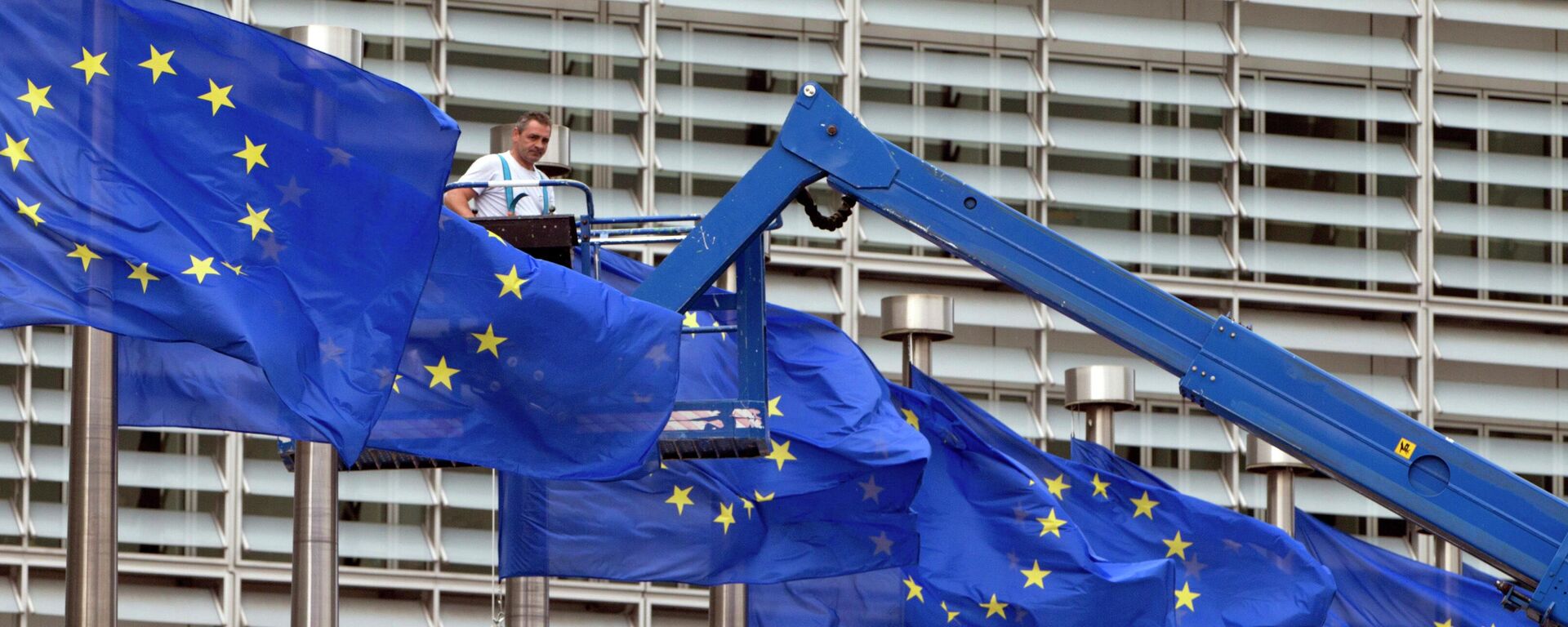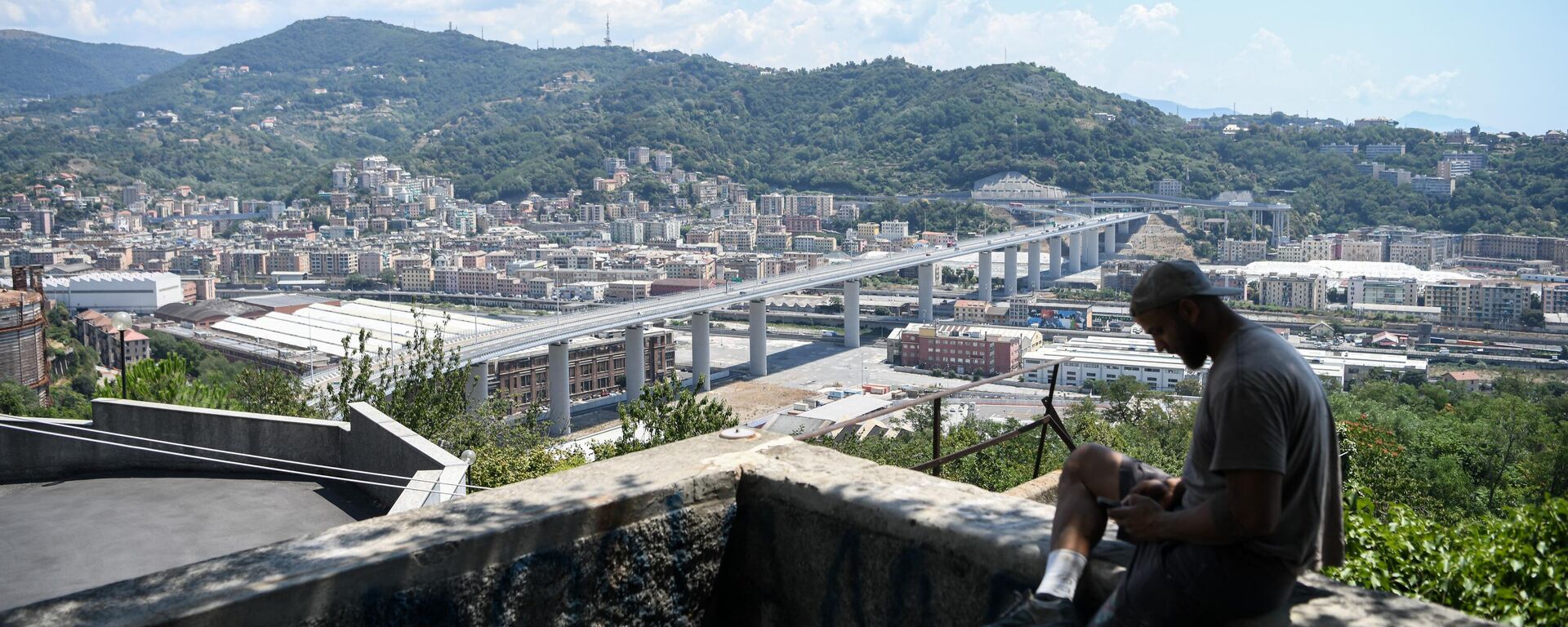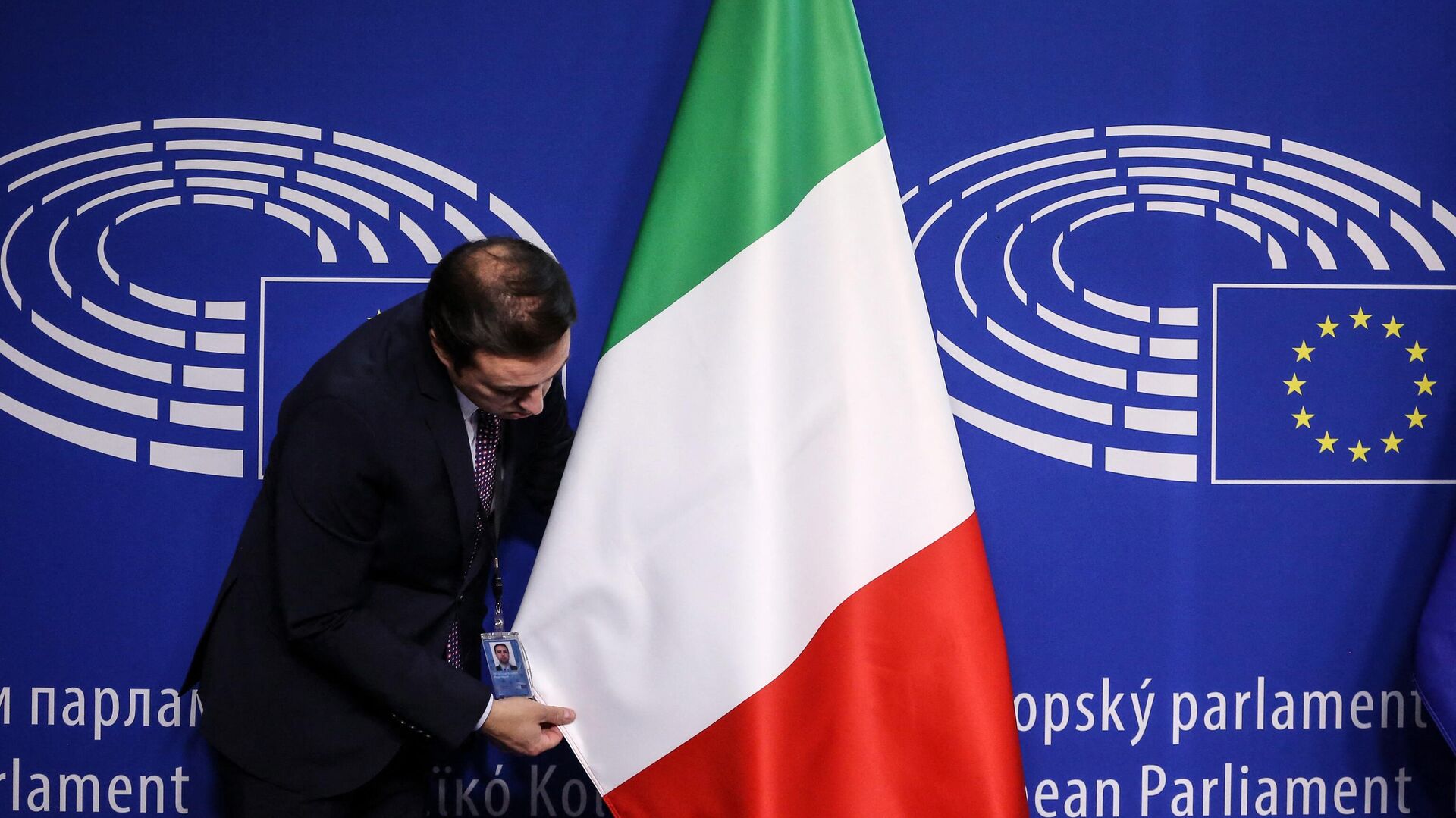https://sputnikglobe.com/20221204/italians-split-over-backfiring-russia-sanctions-but-govt-has-little-wiggle-room-says-expert-1105022775.html
Italians Split Over Backfiring Russia Sanctions, But Gov't Has Little Wiggle Room, Says Expert
Italians Split Over Backfiring Russia Sanctions, But Gov't Has Little Wiggle Room, Says Expert
Sputnik International
Italy's public is polarized over backfiring russia sanctions, bot the gov't has little room for maneuver, expert says
2022-12-04T13:12+0000
2022-12-04T13:12+0000
2023-03-05T11:00+0000
russian economy under sanctions
energy crisis
giorgia meloni
european union (eu)
italy
https://cdn1.img.sputnikglobe.com/img/07e6/0c/04/1105021725_0:161:3071:1888_1920x0_80_0_0_976c23e3b8650d56c33dc6007ba8fee2.jpg
As the negative fall-out from anti-Russian sanctions makes itself increasingly felt in people’s everyday lives, there is a growing polarization within the Italian public regarding the European stance towards Russia, Fabrissi Vielmini, a research fellow at Vision and Global Trends - International Institute for Global Analyses told Sputnik.'Narrow Room For Maneuver'The Italian government cannot depart from the line it has taken in backing the EU’s anti-Russian stance over the Ukrainian issue as it was part of the "pact" that Giorgia Meloni established before being elected, Fabrissi Vielmini said. The conference, an annual high-level gathering, took place in Rome on 2 and 3 December, under the title 'Weathering the Storm: Interdependence, Resilience and Cooperation'.A coalition of center-right forces, which received the support of about 44 percent of voters, won early parliamentary elections in Italy on 25 September, after the government led by PM Mario Draghi collapsed. The leading political force in the country, having received about 26 percent of the vote, is the newly formed right-wing Brothers of Italy party, led by Meloni - Italy's first female prime minister.Meloni's government, the expert emphasized, would follow whatever directives come from Brussels. Thus, Italy will continue to deliver military assistance to Ukraine, in line with a special decree the Italian Council of Ministers adopted on 1 December. Furthermore, it will allow the Meloni government to funnel weapons to the Kiev regime without coordinating the preliminary lists with parliament deputies. Although propping up Ukraine has become a contentious issue within the ruling coalition, which includes Meloni's Brothers of Italy, Matteo Salvini's League and Silvio Berlusconi's Forza Italia parties, Vielmini doesn't expect that the Italian government could make any significant move forward. "...The foreign policy of Italy, unfortunately, is very well defined by its servitude to the Atlantic and European institutions. So basically there is no room for maneuver for Italy to change anything," he said, adding:Vielmini weighed in on how some attendees at the Mediterranean Dialogues Conference, particularly from the Arab world or Africa - such as the UAE and Jordan - have openly praised or supported Russia’s role in solving their own crises. These countries have unflinchingly rejected pressure to break ties with Moscow over the Ukrainian issue, as the EU did. These countries, Vielmini said, are puzzled by the Europeans' decision to plunge themselves into such a deep crisis that was orchestrated outside their borders and against their own interests. Vielmini added, however, that taking into account Italy's present geopolitical environment the "room for maneuver" on the issue of Russia and the Ukraine is "very narrow."'Growing Dissatisfaction'According to the expert, all the factors mentioned earlier are contributing to growing dissatisfaction among the people of Italy. Despite their country's official position on Ukraine, 63 percent of Italians do not want their government’s defense spending increased, a survey carried out by the European Council on Foreign Relations revealed. Among the 27-member EU bloc, Italians are the least convinced that Russia needs to be sanctioned for the Ukraine conflagration, with at least 51 percent of Italian voters supporting an end to the restrictions on Moscow because of the effect it has had on the cost of living. Among the European nationalities questioned, an increasing number of Italians were seen to be most staunchly against funneling military aid to the Kiev regime.Italy, which is reeling from a cost of living crisis that has gripped the European continent, witnessed inflation of 11.8 percent year-on-year in November, according to the Italian National Institute of Statistics. This is one of the highest figures in decades.The economy had initially slowed down during the COVID-19 pandemic, only to find itself hit by backfiring anti-Russian sanctions that western countries imposed after Moscow's launched its special military operation in Ukraine. The Moscow penalties have accelerated inflation and pushed millions of households in European countries to the brink of fuel poverty.A nationwide strike of transport workers and civil servants, including medical and school workers, took place in Italy on 2 December under the auspices of the Confederation of Basic Committees (Cobas) and a number of other trade unions.The trade unions taking part in the protests in major cities, including Rome, Milan, Naples and Genoa, demanded introducing a minimum wage, slashing prices on fuel and basic goods, canceling energy tariffs increases, and the introduction of automatic salary indexing, among other demands, amid growing inflation and the rising cost of living.
https://sputnikglobe.com/20221111/eurozone-to-tip-into-recession-amid-bleak-growth-forecast-as-russia-sanctions-continue-to-backfire-1104018027.html
https://sputnikglobe.com/20221202/trade-union-transport-workers-civil-servants-striking-across-italy-1104978010.html
italy
Sputnik International
feedback@sputniknews.com
+74956456601
MIA „Rosiya Segodnya“
2022
News
en_EN
Sputnik International
feedback@sputniknews.com
+74956456601
MIA „Rosiya Segodnya“
Sputnik International
feedback@sputniknews.com
+74956456601
MIA „Rosiya Segodnya“
italy's public polarized, backfiring russia sanctions, the government has little room for maneuver, coalition of center-right forces, giorgia meloni, growing dissatisfaction among the population of italy, do italians support sending weapons to ukraine, voters support end to moscow sanctions
italy's public polarized, backfiring russia sanctions, the government has little room for maneuver, coalition of center-right forces, giorgia meloni, growing dissatisfaction among the population of italy, do italians support sending weapons to ukraine, voters support end to moscow sanctions
Italians Split Over Backfiring Russia Sanctions, But Gov't Has Little Wiggle Room, Says Expert
13:12 GMT 04.12.2022 (Updated: 11:00 GMT 05.03.2023) Italy, like other countries that fell in line with the US-driven sanctions campaign against Moscow because of its special military operation in Ukraine, has been reeling from a largely self-inflicted cost of living crisis. Skyrocketing inflation and soaring energy costs have been fueled by backfiring restrictions on Russia.
As the negative fall-out from
anti-Russian sanctions makes itself increasingly felt in people’s everyday lives, there is a growing polarization within the Italian public regarding the European stance towards Russia, Fabrissi Vielmini, a research fellow at Vision and Global Trends - International Institute for Global Analyses told Sputnik.
'Narrow Room For Maneuver'
The Italian government cannot depart from the line it has taken in backing the EU’s anti-Russian stance over the Ukrainian issue as it was part of the "pact" that
Giorgia Meloni established before being elected, Fabrissi Vielmini said. The conference, an annual high-level gathering, took place in Rome on 2 and 3 December, under the title 'Weathering the Storm: Interdependence, Resilience and Cooperation'.
A coalition of center-right forces, which received the support of about 44 percent of voters, won early parliamentary elections in Italy on 25 September, after the government led by PM Mario Draghi collapsed. The leading political force in the country, having received about 26 percent of the vote, is the newly formed right-wing Brothers of Italy party, led by Meloni - Italy's first female prime minister.
Meloni's government, the expert emphasized, would follow whatever directives come from Brussels. Thus, Italy will continue to deliver military assistance to Ukraine, in line with a special decree the Italian Council of Ministers adopted on 1 December. Furthermore, it will allow the Meloni government to funnel weapons to the Kiev regime without coordinating the preliminary lists with parliament deputies.
Although propping up Ukraine has become a contentious issue within the ruling coalition, which includes Meloni's Brothers of Italy, Matteo Salvini's League and Silvio Berlusconi's Forza Italia parties, Vielmini doesn't expect that the Italian government could make any significant move forward.
"...The foreign policy of Italy, unfortunately, is very well defined by its servitude to the Atlantic and European institutions. So basically there is no room for maneuver for Italy to change anything," he said, adding:
"This position is increasingly taking its toll on the Italian population who understand that they have nothing to gain [from the conflict] which is against our interests, against the interests of the European economy. So there is a growing rift between the government and the population. As soon as there are other issues in internal politics, this government will start to have a serious problem."
Vielmini weighed in on how some attendees at the Mediterranean Dialogues Conference, particularly from the Arab world or
Africa - such as the UAE and Jordan - have openly praised or supported Russia’s role in solving their own crises. These countries have unflinchingly rejected pressure
to break ties with Moscow over the Ukrainian issue, as the EU did.
These countries, Vielmini said, are puzzled by the Europeans' decision to plunge themselves into such a deep crisis that was orchestrated outside their borders and against their own interests.
"I think they are only waiting for this crisis to end so that they can start all over again. Normal relations aimed at common development and not this confrontation that is against the interests of the ordinary people making the benefit of the Anglo-Americans playing on it," he suggested.
Vielmini added, however, that taking into account Italy's present geopolitical environment the "room for maneuver" on the issue of Russia and the Ukraine is "very narrow."

11 November 2022, 14:04 GMT
'Growing Dissatisfaction'
According to the expert, all the factors mentioned earlier are contributing to growing dissatisfaction among the people of Italy. Despite their country's official position on Ukraine, 63 percent of Italians do not want their government’s defense spending increased,
a survey carried out by the European Council on Foreign Relations revealed.
Among the 27-member EU bloc, Italians are the least convinced that Russia needs to be sanctioned for the Ukraine conflagration, with at least 51 percent of Italian voters supporting an end to the restrictions on Moscow because of the effect it has had on the cost of living. Among the European nationalities questioned, an increasing number of Italians were seen to be most staunchly against funneling military aid to the Kiev regime.
Italy, which is reeling from a cost of living crisis that has gripped the European continent, witnessed inflation of 11.8 percent year-on-year in November, according to the Italian National Institute of Statistics. This is one of the highest figures in decades.The economy had initially slowed down during the COVID-19 pandemic, only to find itself hit by
backfiring anti-Russian sanctions that western countries imposed after Moscow's launched its special military operation in Ukraine. The Moscow penalties have accelerated inflation and pushed millions of households in European countries to the
brink of fuel poverty.

2 December 2022, 14:50 GMT
A
nationwide strike of transport workers and civil servants, including medical and school workers, took place in Italy on 2 December under the auspices of the Confederation of Basic Committees (Cobas) and a number of other trade unions.
The trade unions taking part in the protests in major cities, including Rome, Milan, Naples and Genoa, demanded introducing a minimum wage, slashing prices on fuel and basic goods, canceling energy tariffs increases, and the introduction of automatic salary indexing, among other demands, amid growing inflation and the rising cost of living.





